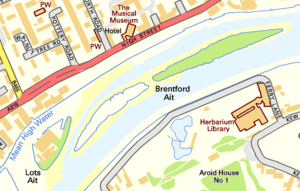Ait facts for kids

An ait (pronounced like eight) or eyot is a small island. These special islands are often found in rivers. You'll hear this word used a lot for the river islands in the River Thames and its smaller rivers in England.
Contents
What is an Ait?
Aits are usually long and narrow. They form when sediment (like sand, mud, and small rocks) builds up in the water over time. This sediment settles and creates a new piece of land.
How Aits Form and Change
Once an ait starts to form, plants can begin to grow on it. These plants help to hold the soil together, making the island more permanent. However, aits can also change! Strong river currents can wear them away, a process called erosion. The worn-away sediment might then travel downstream and help create a new ait somewhere else.
Braided Rivers
Sometimes, a river channel has many aits. This makes the river look like it's splitting into several smaller streams that weave around the islands. When this happens, the river is called a braided channel. It's like the river is braiding itself with islands!
Where Does the Word "Ait" Come From?
The word "ait" has a long history! It comes from an old English word, iggath (or igeth). The main part of this word, ieg, meant "island." The rest of the word was a small ending that meant "little" or "small." So, an ait is literally a "little island."
See also
 In Spanish: Ait (isla) para niños
In Spanish: Ait (isla) para niños
 | Selma Burke |
 | Pauline Powell Burns |
 | Frederick J. Brown |
 | Robert Blackburn |

